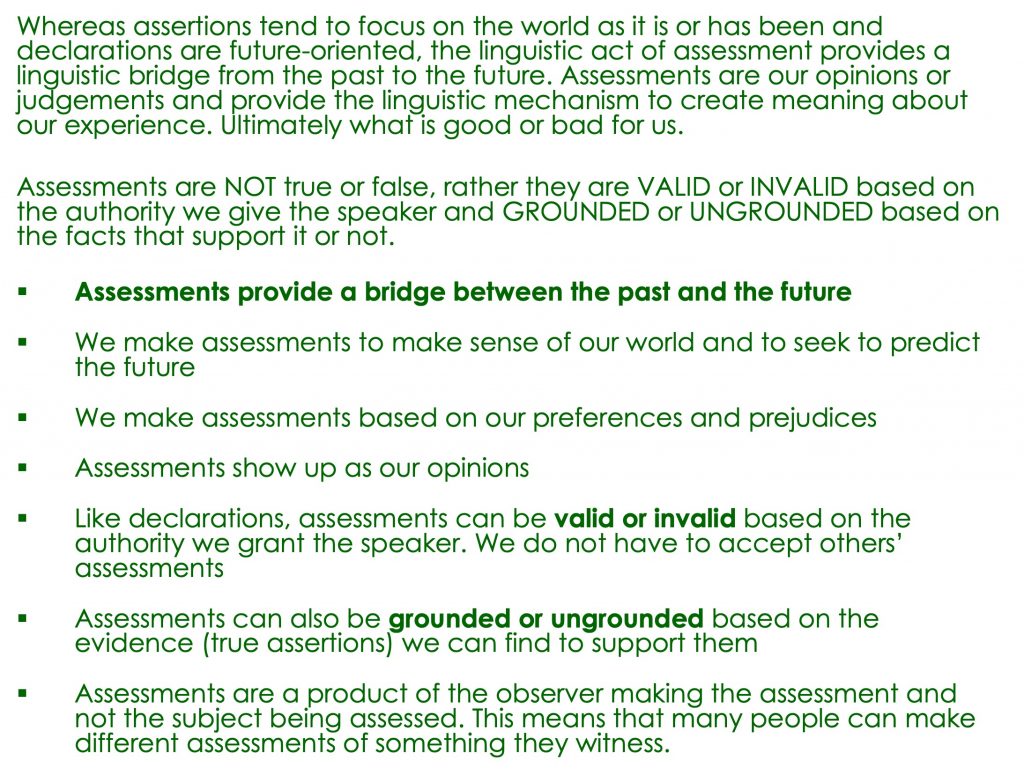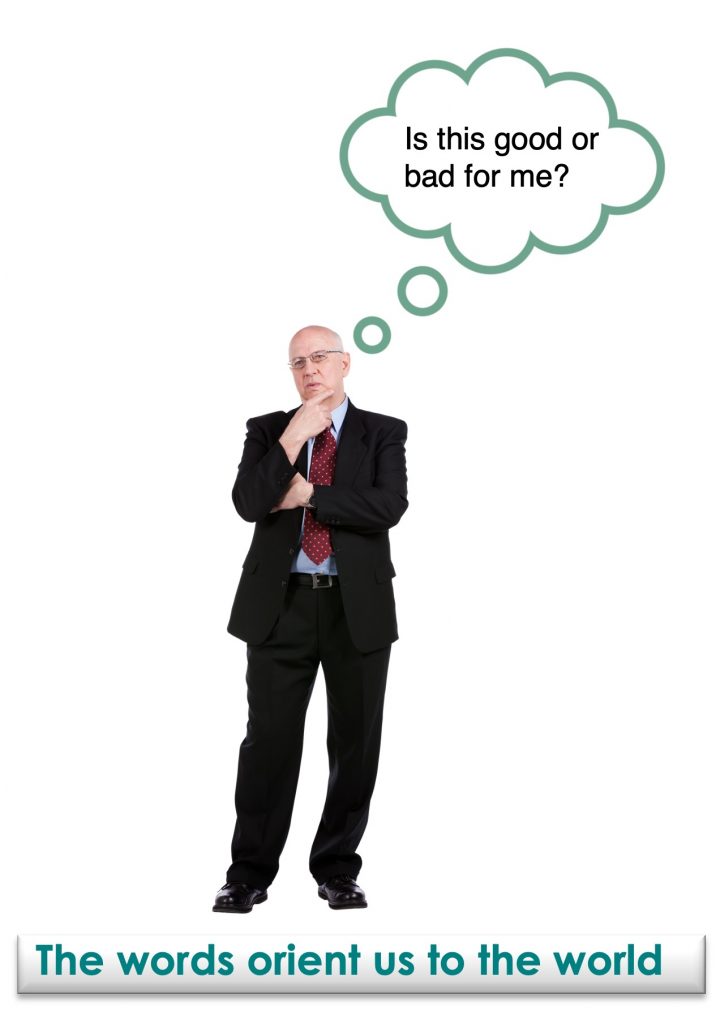
Whereas assertions tend to focus on the world as it is or has been and declarations are future-oriented, the linguistic act of assessment provides a linguistic bridge from the past to the future. Assessments are our opinions or judgements and provide the linguistic mechanism to create meaning about our experience. They are the linguistic approach to exploring risk.
Putting meaning to our experience is such an all-encompassing aspect of the human condition, that we can easily be defined as ‘meaning making organisms’.
Without assessments, we would live in a very bland world. It is one thing to say, “the sun rose at 6am at the beach” and quite another to say, “The sun rose early with glorious splendour, casting long shadows along the beach and gently warming my face”. The first is purely an assertion and tells us what happened. The second contains assessments and speaks to my experience of the sunrise. It is through our assessments that we generate our stories of events, share the meaning of our experience with others and generate relationships. Through our assessments, we can orient ourselves to our observations of the world and take actions that are more likely to address our concerns.
To look at assessments in more depth, let us explore some examples:
- “John is smart”
- “This is the best restaurant in the city”
- “You are my best friend”
When we make an assessment, we draw on our observations of the past to orient ourselves to the future. When I say, “John is smart”, I am basing this assessment on some observations I have made about John that I relate to his level of intelligence against standards I hold and in certain domains and setting the context for how he might act in the future where John is involved.
“This is the best restaurant in the city”, assumes both observations of that particular restaurant and many other restaurants and sets up a context for future culinary experiences at that restaurant and others. Once again, this is opinion will be based on my views about what makes a good restaurant.
“You are my best friend” is based on my feelings for you and possibly speaks to a greater expectation of friendship from you than others in the future.
Because they have a future-based aspect, assessments are similar to declarations in that they can be seen as being valid or invalid based on the authority we give to the speaker. However, as assessments are also linked to our past observations, we can test them to see whether they are ‘grounded’ or ‘ungrounded’. This means an assessment can carry weight based on the amount and relevance of evidence (true assertions) we provide to support that assessment set against certain standards.
Ungrounded assessments are those that have little or no factual evidence to support them; grounded assessments have ample evidence and therefore can provide a more reliable means of orienting ourselves to our observations and assessing how we might act in the future.
As we make assessment based on our past, they tend to be conservative in nature. We assume the past is a good predictor of the future and this may not always be the case. It is reasonable to say there much of life is recurrent, otherwise making assessments would be nonsensical, but we can always be open to questioning our assessments. In this way, we can weigh up their relevance to our future at any point in time. We can assess certain outcomes as not being favourable and seek different actions to generate different outcomes. We can assess other outcomes as being something we want to be repeated and determine to take similar actions in the future to the ones that produced those outcomes. In other words, assessments provide a basis for our learning and an opportunity to design our future ways of doing things.
Very often our assessments remain transparent to us. In part, they are the deeply held preferences and prejudices we hold about ourselves and the world. However, as with all of our transparencies in life, when the world does not progress as we expect, and we have a breakdown, we have the opportunity to identify and then question our transparent assessments to determine their current value in our life.
Unlike an assertion that exists as true or false in a community, an assessment lives with the person who makes it. This does not mean that assessments cannot appear to be shared, as many people have similar opinions, but sharing an assessment does not make it an assertion – these are different linguistic acts. As a result, it can be said an assessment tells us something about the person making it. Someone’s assessments provide the opportunity to gain insight to their history, way of observing, standards, and their biases.
Our assessments can also change when our standards change. For example, in the 1950’s, the four-minute mile was considered a very fast pace for that distance, not so today. The standard for middle distance running is now very different and a four-minute mile would be seen as slow in the domain of elite athletes. This can also apply at a personal level as our own values and standards may change as we go through life. This variability in our assessments is critical for us if we are to change and grow.
When this is explored further, it can also be seen that our standards, preferences and prejudices are assessments built upon some of our core assessments and the social narratives in which we have lived. These may or may not still be relevant to us at this point in life.

